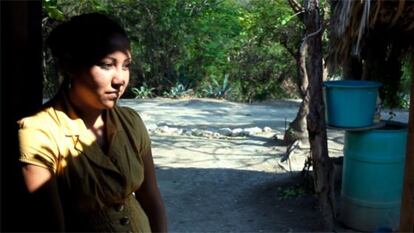Mexican girl sentenced to one year for having an abortion
Term imposed despite police failing to find evidence she underwent the procedure


Just after just turning 18 in July 2009, Hilda entered a public hospital in San Luis Potosí bleeding profusely. According to her, the doctor refused to treat her if she did not explain what had happened. Under pressure and at risk of not receiving medical care, she confessed to undergoing an abortion.
"She [the doctor] told me that this was a crime and wasn’t going to be a part of it," Hilda said in a film documentary made a few months ago.
Despite finding no evidence against her, she was sentenced in 2012 to one year in jail, but has never gone to prison because her lawyers are appealing. On Friday, four years after the incident, Hilda faces a new hearing in her appeal.
Just like Hilda, 151 other women have been criminally prosecuted in Mexico since 2007 for undergoing an abortion, according to the Group on Information about Reproductive Choice (GIRE). The organization has repeatedly protested about what they consider to be the prosecution of women by the authorities in many Mexican states.
Abortion is a punishable practice – except in cases of rape or when the mother’s health is at risk, according to legislation in place in all 31 states, with the exception of the Federal District.
The doctor told me she wasn’t going to be a part of any crime"
In Hilda's case, there was no time to talk to the family. The doctor at the clinic called in the social worker to file a complaint with the prosecutor’s office, and while she was still recovering in the hospital, police stood guard by her room. “I was taken to the police station where they took my mug shot and then asked me many questions," she recalled
A few hours later, authorities released her because they could find no evidence to show that she had had an abortion.
"The next day the local newspaper El Mañana de Valles put her picture on the front page under a headline labeling her as a murderer,” said Itzel Silva, the defense attorney in the case. “She is a strong woman, but this public display affected her. There was a leak of personal data, her address and photograph. It was a violation of privacy. "
I was taken to the police station where they took my mug shot"
Charged by the Attorney General’s Office in July 2012, the young woman was arrested again and locked up for 24 hours until a 3,000-peso bond ($233) was paid. On April 5, Judge Miguel Ángel Ramiro Díaz handed down a guilty verdict and a one-year sentence while also ordering her to pay a fine of 1,039 pesos ($ 81), the lawyer explained.
“We appealed that ruling to a higher court,” Silva said, adding she hopes the decision will come down in two or three weeks.
Among the principle arguments is that Hilda suffered a violation of the right that prohibits people from being subjected to cruel or degrading treatment when it comes to providing healthcare, as expressed by the UN Special Rapporteur on torture and other cruel, inhuman or degrading treatments, John E. Méndez. "If there is no evidence, there is no reason why she has to accept a conviction in which her rights have been violated," Silva said.
In the documentary film 'Viva Mexico' by Flavio Florence, which was released a few months ago in Mexico City and is now being shown in different parts of the country, Hilda appears holding the hand of her daughter, a girl of about three years old. "Yes, I was treated badly by the medical service, the social worker (...)” she says in the film.
Hilda currently has a partner and is trying to go on with her life.
"I want to study and be someone in life,” she said – something that would be much easier once her nightmare is over.
Tu suscripción se está usando en otro dispositivo
¿Quieres añadir otro usuario a tu suscripción?
Si continúas leyendo en este dispositivo, no se podrá leer en el otro.
FlechaTu suscripción se está usando en otro dispositivo y solo puedes acceder a EL PAÍS desde un dispositivo a la vez.
Si quieres compartir tu cuenta, cambia tu suscripción a la modalidad Premium, así podrás añadir otro usuario. Cada uno accederá con su propia cuenta de email, lo que os permitirá personalizar vuestra experiencia en EL PAÍS.
¿Tienes una suscripción de empresa? Accede aquí para contratar más cuentas.
En el caso de no saber quién está usando tu cuenta, te recomendamos cambiar tu contraseña aquí.
Si decides continuar compartiendo tu cuenta, este mensaje se mostrará en tu dispositivo y en el de la otra persona que está usando tu cuenta de forma indefinida, afectando a tu experiencia de lectura. Puedes consultar aquí los términos y condiciones de la suscripción digital.








































